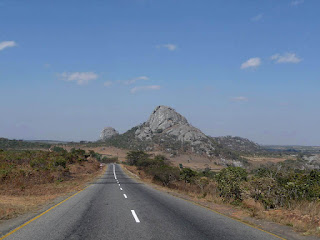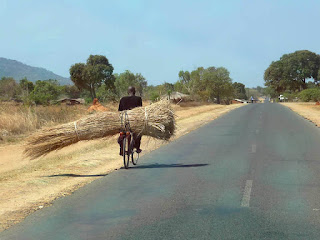16 września rano zebraliśmy się w dalszą drogę. Naszym celem było kupienie dla mnie wizy tranzytowej w miejscowości Mzuzu. Zmroziła nas nieco informacja, że Malawi przeżywa kryzys paliwowy. Rząd nie płacił dostawcom paliwa w efekcie czego ci wycofali się z rynku. Niestety nie zatankowaliśmy samochodu do pełna w Tanzanii i teraz musieliśmy liczyć, że szczęśliwie uda nam się gdzieś dostać „napęd”. Po przekroczeniu granicy byliśmy świadkami jak na policyjnej blokadzie drogowej pewien kierowca otworzył bagażnik swego auta który był wypełniony po brzegi kanistrami. Po krótkiej dyskusji z policjantem chciał mu wręczyć łapówkę, ale, że działo się to na naszych oczach dostał po łapkach od wzburzonego stróża prawa. Aby mogło dojść do „transakcji” policjant nakazał nam wyjazd ze strefy kontroli i życzył szerokiej drogi. Myśleliśmy, że człowiek przewoził kanistry ze spirytusem ale teraz wiedzieliśmy już, że było to paliwo.
Droga do Mzuzu upłynęła nam na zatrzymywaniu się na każdej stacji paliw. Niestety bez sukcesy. W biurze imigracyjnym bardzo miły oficer zabrał się za moją sprawę i już po godzinie i zapłaceniu 50 USD wkleił do mego paszportu upragnioną wizę, która była ważna 7 dni, ale nie od daty przekroczenia granicy tylko od daty jej wydania w Mzuzu. Mogłem cieszyć się 10 dniowym pobytem w Malawi – tylko jak tu zwiedzać kraj bez paliwa?
Postanowiliśmy, że z Mzuzu pojedziemy przez góry do Kasungu i jeżeli tam dostaniemy paliwo to skierujemy się nad jezioro Malawi do Nkhotakota. Na drodze stanął nam jednak patrol policji, chcący ukarać mnie wysokim mandatem za zbyt szybką jazdę. Powiedziałem, że nie mam pieniędzy, a banki były już zamknięte, i na nieszczęście nasze karty kredytowe nie działają w Malawi więc najlepiej by było, gdybyśmy mogli kontynuować podróż. Czekaliśmy przez godzinę na poboczu drogi by dowiedzieć się, że policjanci kończą pracę i musimy z nimi jechać na komisariat. Pojechaliśmy pierwsi i czekaliśmy na przyjazd patrolu. Chyba się zdziwili na nasz widok, bo przecież każdy normalny człowiek w takiej sytuacji pojechał by sobie w siną dal. Oficer jeszcze raz nas zapytał, czy nie mamy chociaż jakiejś małej kwoty i gdy usłyszał, że jednak jej nie mamy, zrezygnowany powiedział, że powinniśmy wozić ze sobą pieniądze na płacenie mandatów i inne nieprzewidziane wydatki (czytaj łapówki) podczas podróży. Pokiwaliśmy głowami ze zrozumieniem, gorąco przeprosiliśmy za powstałe z naszej winy zamieszanie, solennie obiecaliśmy, że od jutra nasze portfele będą wypchane lokalną walutą kwacha i pożegnaliśmy się z panem.
Bardzo szybko zrobiło się ciemno, bo słońce w tej części świata zachodzi o 17:00 i kilka godzin zajęło nam dojechanie do kempingu który okazał się być nieczynny, ale mogliśmy tu przenocować. Rano dowiedzieliśmy się, że w sąsiedniej wiosce pan Czesław ma uprawę pieczarek, ale niedawno poleciał do Polski na wakacje.
W Kasunga nie było paliwa (można było kupić je tylko na czarnym rynku za 4 USD za litr) więc musieliśmy skierować się do stolicy kraju Lilongwe w nadziei, że tam się nam powiedzie i rzeczywiście na jednej ze stacji po odczekaniu swego w długiej kolejce mogliśmy kupić 50 litrów napędu. Tylko tyle nam pozwolono nalać do zbiornika. Czekaliśmy w Lilongwe jeszcze 3 dni w nadziei, że uda się napełnić zbiornik do pełna, ale bez sukcesu. Wykorzystałem ten czas na wymianę olejów, ustawienie geometrii, prania i porządkowanie samochodu. Obliczyliśmy, że wystarczy nam paliwa by pojechać najkrótszą drogą nad jezioro Malawi i stamtąd do granicy z Zambią. Przed wyjazdem skorzystaliśmy jeszcze z porad Mika z RPA, dużego, łysego faceta z kitkiem a’la kozak, brodą i wąsami, który zajmuje się ochroną przyrody. Zjechał południe Afryki wzdłuż i wszerz i udzielił nam wskazówek co do dalszej części naszej podróży.
Droga do Mzuzu upłynęła nam na zatrzymywaniu się na każdej stacji paliw. Niestety bez sukcesy. W biurze imigracyjnym bardzo miły oficer zabrał się za moją sprawę i już po godzinie i zapłaceniu 50 USD wkleił do mego paszportu upragnioną wizę, która była ważna 7 dni, ale nie od daty przekroczenia granicy tylko od daty jej wydania w Mzuzu. Mogłem cieszyć się 10 dniowym pobytem w Malawi – tylko jak tu zwiedzać kraj bez paliwa?
Postanowiliśmy, że z Mzuzu pojedziemy przez góry do Kasungu i jeżeli tam dostaniemy paliwo to skierujemy się nad jezioro Malawi do Nkhotakota. Na drodze stanął nam jednak patrol policji, chcący ukarać mnie wysokim mandatem za zbyt szybką jazdę. Powiedziałem, że nie mam pieniędzy, a banki były już zamknięte, i na nieszczęście nasze karty kredytowe nie działają w Malawi więc najlepiej by było, gdybyśmy mogli kontynuować podróż. Czekaliśmy przez godzinę na poboczu drogi by dowiedzieć się, że policjanci kończą pracę i musimy z nimi jechać na komisariat. Pojechaliśmy pierwsi i czekaliśmy na przyjazd patrolu. Chyba się zdziwili na nasz widok, bo przecież każdy normalny człowiek w takiej sytuacji pojechał by sobie w siną dal. Oficer jeszcze raz nas zapytał, czy nie mamy chociaż jakiejś małej kwoty i gdy usłyszał, że jednak jej nie mamy, zrezygnowany powiedział, że powinniśmy wozić ze sobą pieniądze na płacenie mandatów i inne nieprzewidziane wydatki (czytaj łapówki) podczas podróży. Pokiwaliśmy głowami ze zrozumieniem, gorąco przeprosiliśmy za powstałe z naszej winy zamieszanie, solennie obiecaliśmy, że od jutra nasze portfele będą wypchane lokalną walutą kwacha i pożegnaliśmy się z panem.
Bardzo szybko zrobiło się ciemno, bo słońce w tej części świata zachodzi o 17:00 i kilka godzin zajęło nam dojechanie do kempingu który okazał się być nieczynny, ale mogliśmy tu przenocować. Rano dowiedzieliśmy się, że w sąsiedniej wiosce pan Czesław ma uprawę pieczarek, ale niedawno poleciał do Polski na wakacje.
W Kasunga nie było paliwa (można było kupić je tylko na czarnym rynku za 4 USD za litr) więc musieliśmy skierować się do stolicy kraju Lilongwe w nadziei, że tam się nam powiedzie i rzeczywiście na jednej ze stacji po odczekaniu swego w długiej kolejce mogliśmy kupić 50 litrów napędu. Tylko tyle nam pozwolono nalać do zbiornika. Czekaliśmy w Lilongwe jeszcze 3 dni w nadziei, że uda się napełnić zbiornik do pełna, ale bez sukcesu. Wykorzystałem ten czas na wymianę olejów, ustawienie geometrii, prania i porządkowanie samochodu. Obliczyliśmy, że wystarczy nam paliwa by pojechać najkrótszą drogą nad jezioro Malawi i stamtąd do granicy z Zambią. Przed wyjazdem skorzystaliśmy jeszcze z porad Mika z RPA, dużego, łysego faceta z kitkiem a’la kozak, brodą i wąsami, który zajmuje się ochroną przyrody. Zjechał południe Afryki wzdłuż i wszerz i udzielił nam wskazówek co do dalszej części naszej podróży.
Transit visa and fuel problems
On the morning of the 16th we made a move for Mzuzu in order to sort out Adam’s transit visa. The previous day we’d been dismayed to learn that Malawi is in the grip of a fuel crisis. Apparently, the government has been failing to pay fuel suppliers for so long that only one company is still willing to do business with them, and nationwide deliveries of both petrol and diesel are now very erratic. Unaware of this situation, we’d left Tanzania with a half empty tank, and now we could only hope that we’d be lucky enough to find a recently replenished filling station. Just after crossing the Tanzania/Malawi border we’d stopped at a police roadblock where we saw a driver opening the boot of his vehicle to reveal a stockpile of full plastic jerry cans. Following a brief exchange with the attending officer he’d attempted handing him a bundle of rolled-up banknotes, but as this was done in our full view, the driver was promptly rapped across the knuckles by the affronted policeman, who swiftly waved us on our way so that the ‘transaction’ could be completed without witnesses. Coming from Poland, we’d assumed that the motorist was trying to smuggle in a consignment of alcohol, but now it dawned on us that it must have been fuel.
We punctuated our journey to Mzuzu with stops at every fuel station along the way, but to no avail.
On reaching Mzuz’s Immigration Office a very polite official set about dealing with Adam’s visa application and after an hour of shuffling papers, walking from one office to another and taking payment of 50 USD the visa was ready – it had been validated for seven days, though not from the date that we’d crossed the border, but from the day of its issue in Mzuzu. In consequence, Adam could now enjoy a 10-day stay in Malawi. The only remaining problem was where to find the diesel that would allow us to actually see something of the country.
With the afternoon drawing to a close we decided to drive from Mzuzu to Kasungu along a scenic mountain route, and on the following day (fuel situation permitting) to head to Nkhotakota on the shores of Lake Malawi; however, our plans were disrupted by traffic police wanting to give Adam a hefty fine for speeding. Having told the policemen that we had no cash on us, and with the banks already shut for the day and Malawi’s ATMs not willing to accept our cards, Adam suggested that it would be best if we were simply allowed to go on our way. The response to this was that our vehicle would be impounded for the night until the banks reopened in the morning and that we were to await further instruction at the roadside. An hour later we were told that the policemen had reached the end of their working day and that we were to proceed to the local police station, where they would meet us. We drove on ahead as instructed and waited for the traffic patrol to arrive. On reflection, the expectation was probably that we would scarper given this prime opportunity to do so, as the officers looked astounded to find us at their headquarters. We were approached by a senior officer who asked us if we were absolutely certain that we didn’t have even a small sum of money with us; on hearing that we didn’t, with a disconsolate look on his face, he told us that we were free to go, but in future we should always have a little cash on hand “for paying fines and other disturbances [giving bribes?] on the road”. Nodding gravely we bid the officer farewell, apologised for not being adequately prepared for “disturbances” on Malawi’s roads and promised that from tomorrow our wallets would be full of kwacha for this eventuality.
As the sun had set at 5pm, it was now completely dark. When we finally arrived at the mountain lodge where we’d planned to camp for the night we found that it had been shut down, though the security guards were kind enough to allow us to stay there anyway. Chatting to them in the morning we discovered that a Pole by the name of Czesław lives in a neighbouring village and runs a mushroom farm, but was currently on holiday in Poland.
There was no diesel to be had in Kasungu (except on the black market at a price of 4 USD per litre), so our best bet was to head for Malawi’s capital, Lilongwe, in the hope of finding some. There, we did eventually come upon a filling station that had just received a fuel delivery and was easily identifiable by the long queue of cars lined up at each pump. Having patiently waited our turn we were allowed to buy no more than 50 litres. Over the next three days’ stay in Lilongwe we were unable to add to this total, though we put the time to good use, getting the car’s oil changed and its wheels aligned, giving it a thorough tidy and getting a very large mound of washing done. We calculated that we had enough diesel to reach Lake Malawi via the shortest possible route and from there to the Zambian border. Before leaving we received a few valuable tips from Mike – a burly South African conservationist with a deep voice, a bald pate (save for a Cossack-style ponytail) and a black goatee beard. He had travelled very extensively in southern Africa and had some invaluable advice about things to do and see on the next leg of our journey.





Brak komentarzy:
Prześlij komentarz